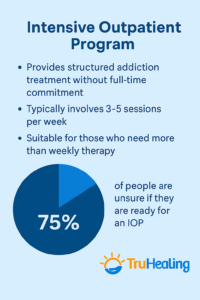If you’ve landed on this blog, you’re likely carrying two stories: the one the world sees—and the one that’s unfolding quietly inside your life.
Outwardly, things may look intact. You’re still working. Showing up for family. Keeping the bills paid. But inside, the pressure is building. You’re exhausted from juggling. From hiding. From telling yourself you don’t have a “real” problem, even though it’s taking up more of your energy just to get through the day.
This blog isn’t about labels. It’s not about forcing a decision. It’s about offering you some clarity—especially if you’re unsure whether outpatient treatment, like an Intensive Outpatient Program (IOP), is “too much” for where you are.
1. You’re Still “Functioning,” But You Know You’re Not Okay
There’s a unique kind of suffering that comes with being high-functioning and dependent. You might not be waking up in jail or losing jobs. But you are waking up tired. Irritable. Foggy. You plan your day around when you can drink or use without being noticed. You’re always one step ahead of getting caught, and it’s wearing you down.
You’re surviving—but not really living.
An intensive outpatient program in Cincinnati can offer a middle path. It doesn’t require you to leave your whole life behind. It helps you take control of it again—before things fall apart.
2. You’ve Tried to Cut Back… and It Didn’t Work (Again)
Maybe you’ve set limits: only weekends, never before dinner, only certain substances. And maybe you’ve even stuck to them—for a while. But then stress hits. Or something triggers you. Or you just decide to break the rule because “it’s not that bad.”
If you’ve made—and remade—these rules a hundred times, and they never quite stick, it’s not because you lack discipline. It’s because dependence is smarter than rules. IOP gives you actual tools—not just willpower. You don’t have to figure it out alone.
3. The Question That Won’t Leave You Alone: “Do I Really Have a Problem?”
It’s one of the hardest questions to answer when you’re still semi-functional. You might not be blacking out or losing everything—but you’re thinking about substances more than you want to. You’re using to cope, to relax, to sleep, to feel okay.
You might not feel “addicted.” But what would it feel like to not need it at all?
IOP gives you space to ask that question without shame. Without pressure. Without having to already know the answer. At TruHealing Cincinnati, we meet people every day who aren’t sure what they need—but know they’re not where they want to be. That’s enough to start.
4. Someone You Trust Has Raised a Concern—Even Subtly
Not everyone gets a dramatic wake-up call. Sometimes concern shows up as a quiet question: “Rough night last night?” Or a partner who avoids kissing you after a drink. A friend who makes a sideways comment about “needing a break.”
It’s easy to dismiss these moments. But if they’re sticking with you, there’s probably a reason. You’re not overreacting by considering help. You’re listening to the part of you that still wants to be honest.
An outpatient program won’t shame you for waiting this long. It’ll support you in moving forward.
5. You’re Tired of Carrying This Alone
You’re the responsible one. The one who keeps it all together. You’re not someone people think of as needing help.
But maybe you do. Not because you’re failing—but because even strong people need support.
In our Cincinnati IOP at TruHealing, people often arrive saying, “I can’t believe I’m here.” And weeks later, they’re saying, “I can’t believe I waited this long.” You don’t have to wait for a breakdown. You can choose recovery while your life is still standing.
What Is an Intensive Outpatient Program (IOP), Really?
An IOP offers structured support without requiring you to live at a facility. At TruHealing Cincinnati, our intensive outpatient program includes:
- Group and individual therapy
- Skills for managing stress, cravings, and emotions
- A community of people who understand what you’re facing
- Flexible scheduling that works around your job or family responsibilities
You typically attend several sessions a week, making IOP ideal for people who need more than a weekly therapist—but don’t need full-time inpatient care.
🚩 Signs You Might Be Ready for Outpatient Treatment
- You’ve tried to moderate or quit, but it hasn’t lasted
- You use to cope with stress, sleep, or emotional pain
- You feel anxious if you don’t have access to substances
- Loved ones have expressed concern—even subtly
- You’re not in crisis… but you’re not at peace, either
Frequently Asked Questions About Outpatient Treatment
Is outpatient treatment only for “mild” cases?
No. Outpatient care is for anyone who doesn’t require 24/7 supervision or detox—but still needs serious support. Many high-functioning individuals benefit from IOP before their substance use escalates.
Can I work while doing IOP?
Yes. Most IOPs, including ours at TruHealing Cincinnati, are designed to accommodate work schedules with day and evening options.
What if I’m not sure I’m an addict?
You don’t need a label to get help. If your substance use is interfering with your life, your peace, or your relationships—it’s worth exploring. IOP is a safe space to do that.
Will people find out I’m in treatment?
Outpatient treatment is private and confidential. You’re not required to tell your employer unless it affects your availability—and even then, you’re protected under medical privacy laws.
What if I start and realize it’s not for me?
That’s okay. Just starting is a step. Many people adjust their treatment as they go. You’re never locked in—you’re in charge of your recovery path.
You Don’t Have to Be Falling Apart to Start Getting Better
There’s strength in catching yourself before you break. In asking questions before everything collapses. You don’t need a dramatic bottom to begin recovery. You just need enough honesty to say: this isn’t working anymore.
If you’re in Cincinnati and you’re wondering whether it’s time, call us. Talk it through. No pressure. Just clarity.
📞 Call TruHealing Cincinnati at (513) 643-9117 or learn more about our intensive outpatient program. We’ll meet you where you are—and walk with you toward where you want to be.


